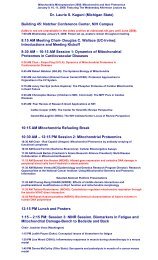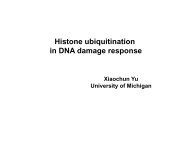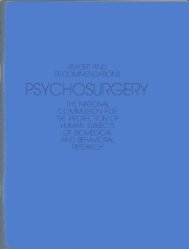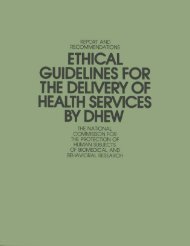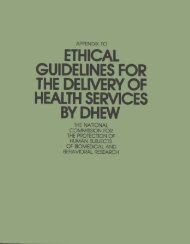RESEARCH ON THE FETUS - National Institutes of Health
RESEARCH ON THE FETUS - National Institutes of Health
RESEARCH ON THE FETUS - National Institutes of Health
Create successful ePaper yourself
Turn your PDF publications into a flip-book with our unique Google optimized e-Paper software.
As Commissioner Robert E. Cooke, M.D., who is sophisticated in research<br />
procedures, pointed out in his Critique <strong>of</strong> the Battelle Report: "The only true<br />
objective approach beyond question, since scientists make [the analysis <strong>of</strong> the<br />
necessity for nontherapeutic fetal research], is to collect information and analyze<br />
past research accomplishments with the intention <strong>of</strong> disproving, not proving<br />
the hypothesis that research utilizing the living human fetus nonbeneficially is<br />
necessary." The Battelle Report seems to me not in accord with the Congressional<br />
intention in that it proceeds from a viewpoint opposite to that quoted, and is<br />
really an effort to prove the indispensability <strong>of</strong> nontherapeutic research. In<br />
any event, if that is its purpose, it fails to achieve it, for most <strong>of</strong> what it<br />
claims to have been necessary could be justified as therapeutic research or at<br />
least as noninvasive <strong>of</strong> the fetus (e.g., probably amniocentesis). In view <strong>of</strong><br />
haste with which this statement must be prepared if it is to accompany the Commission's<br />
report, rather than enlarge upon these views now I refer both to the<br />
Cooke Critique and the Battelle Report itself both-<strong>of</strong> which I am informed will<br />
be a part <strong>of</strong> or appended to the Commission's Report.<br />
An emotional plea was made at the Commission's hearings not to acknowledge<br />
limitations on experimentation that would inhibit the court-granted permissive<br />
abortion. However, until its last meeting, I think the Commission for the most<br />
part admirably resisted the temptation to distort its purpose by pro-abortion<br />
advocacy. But at the last meeting, without prior preparation or discussion, it<br />
adopted Recommendation (12) promotive <strong>of</strong> research on abortion techniques. This<br />
I feel is not germane to our task, is imprudent and certainly was not adequately<br />
considered.<br />
Finally, I do not think that the Commission should urge lifting the moratorium<br />
on fetal research as stated in Recommendation (16). To the extent that<br />
duration <strong>of</strong> the moratorium is controlled by Section 213 <strong>of</strong> the <strong>National</strong> Research<br />
Act, the subject is beyond our control and we ought not assume authority that is<br />
not ours. This is matter not for us and not, ultimately, for any administrative<br />
<strong>of</strong>ficial, but for Congress. If the American people as a democratic society<br />
really intend to withdraw from the fetus and nonviable infant the protection <strong>of</strong><br />
the established principles governing human experimentation, that action I feel<br />
should come from the Congress <strong>of</strong> the United States, in the absence <strong>of</strong> a practical<br />
way to have a national vote. Assuming that any representative voice is adequate<br />
81



